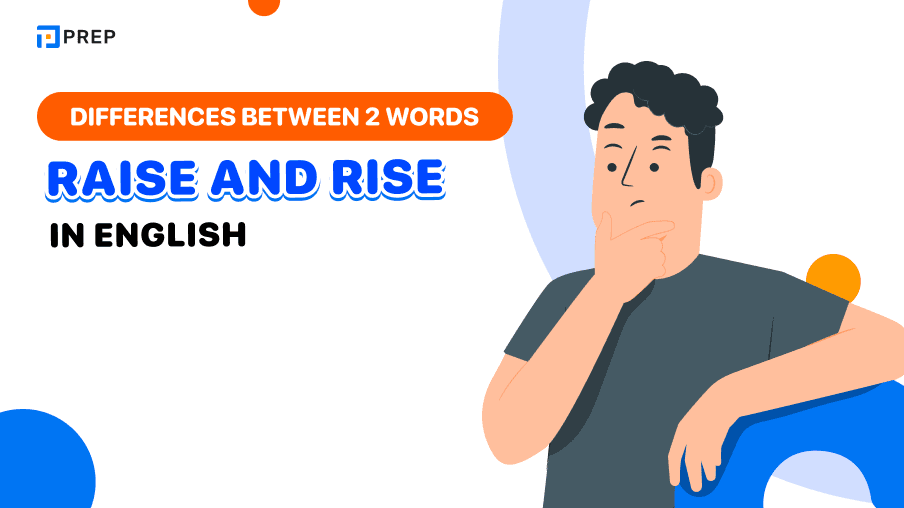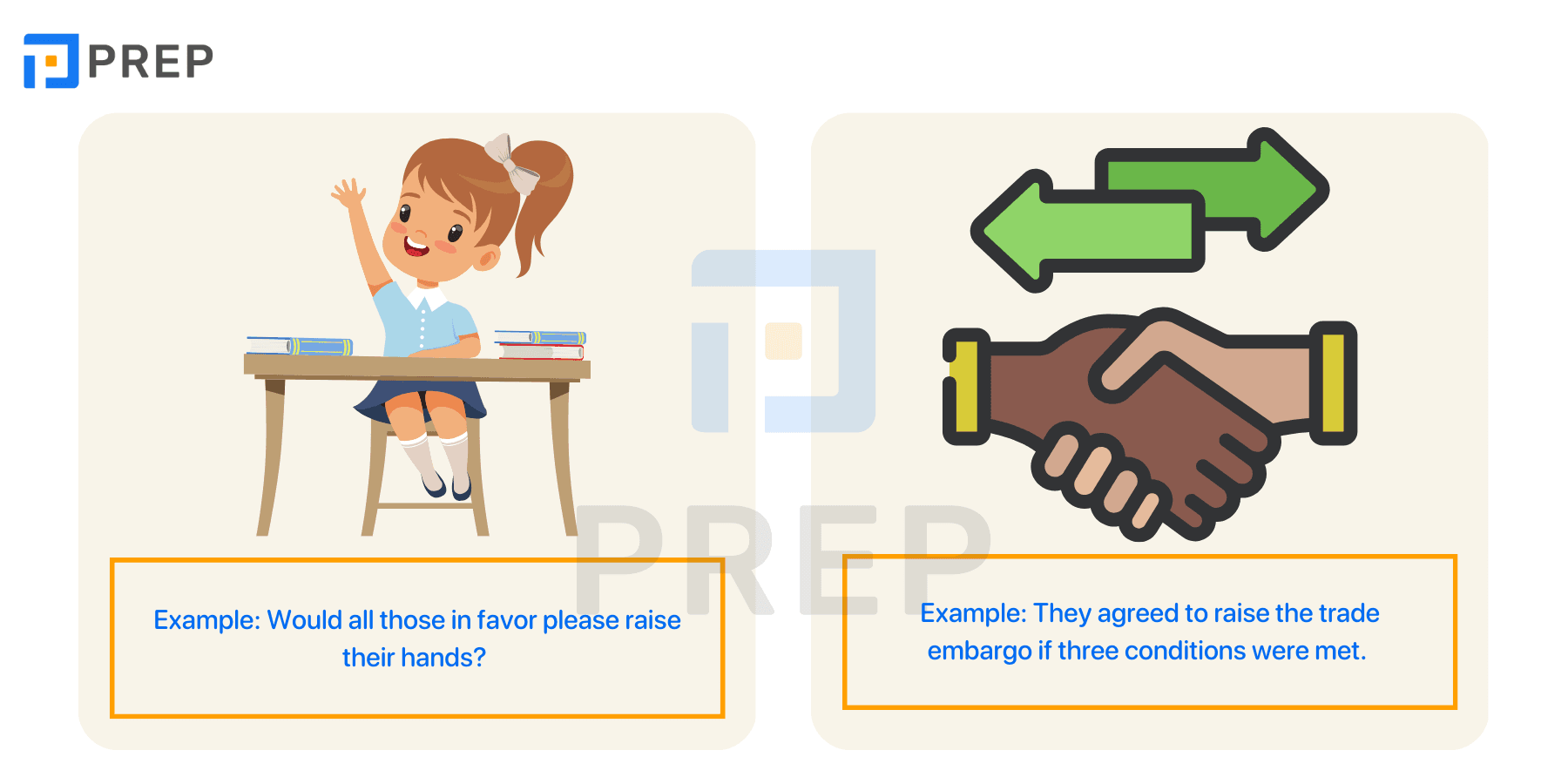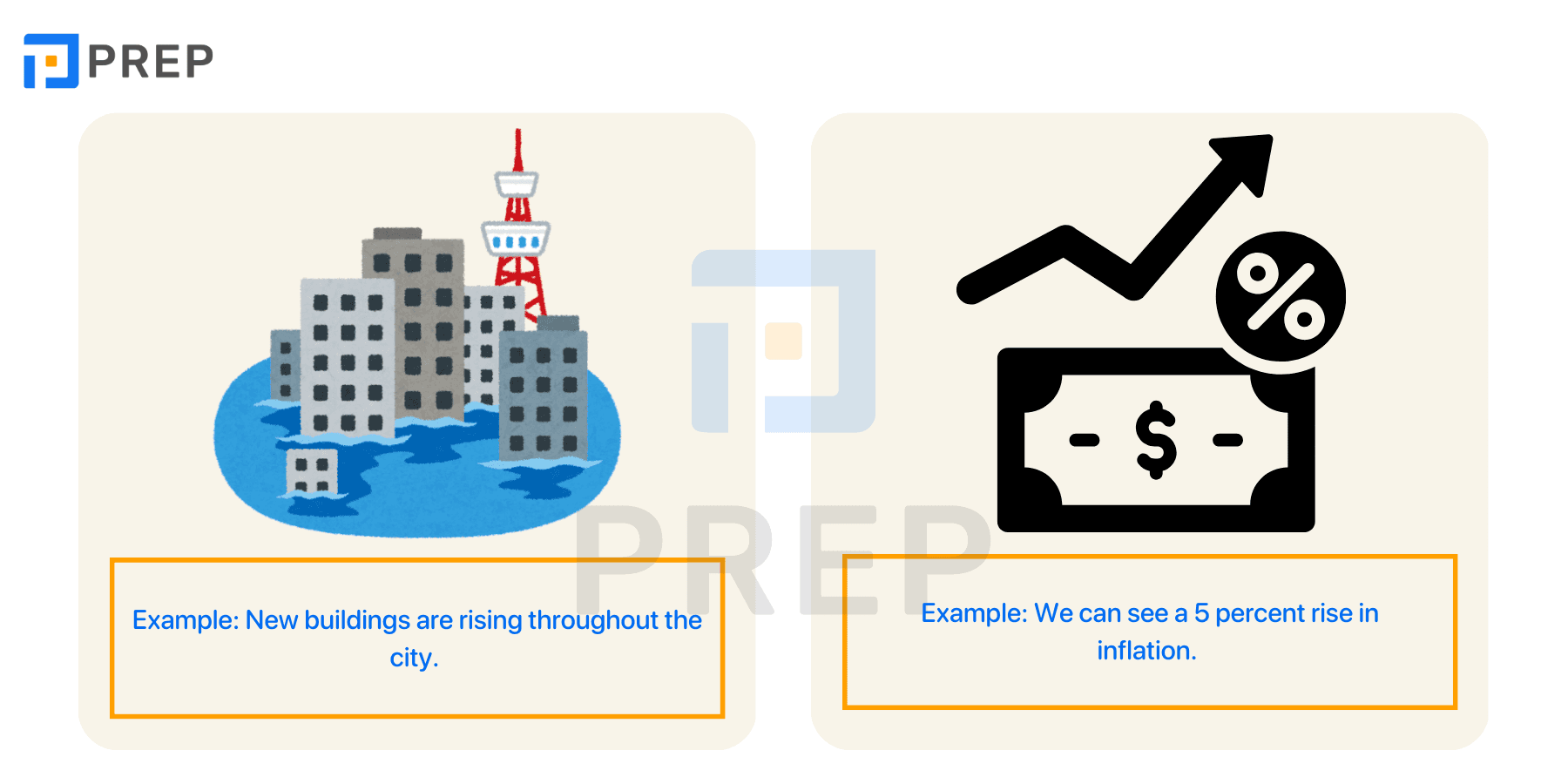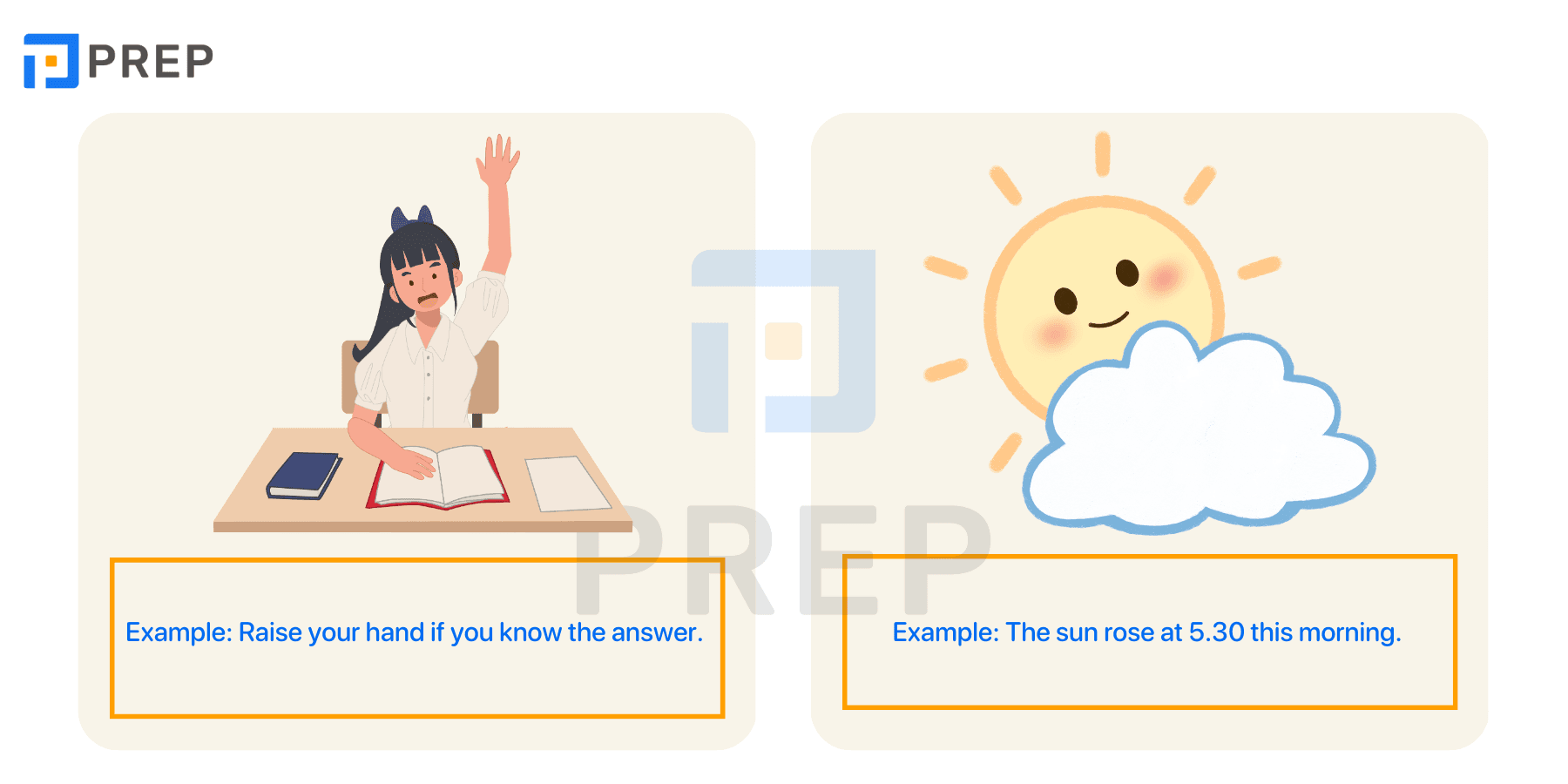Raise and Rise: Meaning, Grammar Rules, and Examples
The verbs Raise and Rise often confuse English learners, especially in exams like IELTS and TOEFL. This guide explains their meanings, grammar rules, and key differences with examples in everyday and academic contexts. Practice with exercises to avoid common mistakes.

I. What Do Raise and Rise Mean?
The verbs “raise” and “rise” are often confused by English learners. At first glance, they look and sound similar, and both can relate to an upward movement or increase. However, they differ in meaning, grammar, and usage—and using the wrong one in speaking or writing can lead to misunderstanding.
Definition of “Raise”
The verb raise is a transitive verb, which means it requires an object—you raise something.
According to the Cambridge Dictionary: Raise /reɪz/ (verb): to lift something to a higher position; to increase the level or amount of something.

Examples:
- The teacher asked us to raise our hands before speaking.
- They decided to raise the price of tickets.
- She has raised three children on her own.
Raise functions like an action that someone does to something else.
-
For expression variety in formal writing, see make use of.
Definition of “Rise”
The verb rise is an intransitive verb, which means it does not take an object—it happens by itself.
According to the Cambridge Dictionary: Rise /raɪz/ (verb): to move upwards; to increase; to get up from a lying or sitting position.

Examples:
- The sun rises at 6 a.m.
- Prices have risen steadily in recent months.
- He rose from his seat to address the audience.
Rise is often used when the subject lifts or increases on its own—nothing else is causing it directly.
-
For vocabulary related to changes in income, review wage and salary.
There are three main reasons why ESL learners often confuse these two verbs:
- Spelling and sound: Both start with “rais-” and are short, simple verbs.
- Similar meaning: Both suggest something going "up."
- Overlap in translation: In some languages, only one verb is used for both.
To avoid confusion, always ask:
- “Is something being done to another thing?” → Use raise (needs object).
- “Is something happening by itself?” → Use rise (no object).
1. Grammar Rules for Raise and Rise
Although raise and rise may share similar meanings related to upward movement or increase, they obey very different grammar rules. Mastering the grammar of these two verbs will help you use them accurately in spoken and written English.
Basic Structure
|
Verb |
Verb Type |
Sentence Structure |
Examples |
|
Raise |
Transitive |
Subject + raise + object |
She raised her hand. (object = her hand) |
|
Rise |
Intransitive |
Subject + rise (no object) |
The sun rose at 6 a.m. (no object) |
Raise must be followed by a direct object—you do something to something else.
Rise does not take an object—it happens on its own.
Verb Forms and Conjugation
|
Verb |
Base Form |
Past Simple |
Past Participle |
Verb Type |
|
Raise |
raise |
raised |
raised |
Regular |
|
Rise |
rise |
rose |
risen |
Irregular |
- Raise is a regular verb: raised – raised
- Rise is an irregular verb: rose – risen
Examples with tenses:
- They raised salaries last year.
- Prices have risen since January.
Typical Usage Contexts
Raise is common in situations where a person or subject intentionally causes something to move or increase:
- Raise your voice
- Raise money
- Raise children
- Raise awareness
- Raise your hand
Rise is used when things increase, grow, or move upwards by themselves:
- The temperature is rising
- Interest rates rose
- The wind is rising
- Smoke rose from the fire
- She rose from her chair
Key reminder for learners:
- If you can add “something” after the verb, use raise.
- If not, and the action is natural or automatic, use rise.
2. Key Differences Between Raise and Rise
Although raise and rise are both verbs related to upward movement or an increase, they differ significantly in grammar, structure, and usage. For many English learners, especially ESL students, these two words are frequently confused due to similar spelling and related meanings. This section will help you clarify the key distinctions step by step.

Similarities
- Both are verbs that describe an increase or upward motion.
- Both appear often in everyday, business, and academic English.
- Both can refer to changes in value (example: salary, price, temperature).
Despite these surface-level similarities, their grammar and sentence patterns are completely different.
Raise vs. Rise – Comparison Table
|
Feature |
Raise |
Rise |
|
Part of speech |
Verb (transitive) |
Verb (intransitive) |
|
Object requirement |
Requires a direct object |
No object needed |
|
Verb type |
Regular verb (raise – raised – raised) |
Irregular verb (rise – rose – risen) |
|
Passive voice usage |
Yes: "was raised", "has been raised" |
No: "was risen" is incorrect |
|
Used by |
A person or thing that causes another to move |
The subject moves or increases by itself |
|
Common expressions |
raise your hand, raise awareness, raise funds |
rise early, prices rise, the sun rises |
|
Example |
She raised her voice during the discussion. |
The sun rises at 6 a.m. |
Key rule:
- Use raise if someone or something causes an increase in something else.
- Use rise when something increases or moves upward on its own.
Common Mistakes and How to Avoid Them
Below are some frequent mistakes learners make when using "raise" and "rise," along with corrections and brief explanations.
|
Incorrect Sentence |
Correct Sentence |
Why It’s Wrong |
|
The flag was risen during the ceremony. |
The flag was raised during the ceremony. |
"Rise" cannot be used in the passive voice. |
|
I rise my hand when I have a question. |
I raise my hand when I have a question. |
"Raise" requires a direct object like "hand." |
|
He raised from the table without saying a word. |
He rose from the table without saying a word. |
"Rise" is correct because no object is involved. |
Quick tip:
- If you can answer the question "What?" after the verb, use raise.
- If you cannot, and the subject acts independently, use rise.
II. Examples of Raise and Rise in Sentences
Seeing "raise" and "rise" used in real sentences is one of the most effective ways to fully understand how they function. While both verbs can relate to movement or increase, their grammatical behaviors are very different.
This section presents grouped examples so you can see how each verb works in everyday English, academic or professional contexts, and even in more advanced or idiomatic usage.
Everyday English Usage
Examples with raise
- Please raise your hand if you have a question.
- They raised the volume to hear the music better.
- She raised her voice during the argument.
Examples with rise
- The sun rises in the east and sets in the west.
- Smoke rose from the chimney into the cold sky.
- Prices are rising quickly this year.
Academic and Business Contexts
Examples with raise
- The company raised salaries by five percent last quarter.
- He raised concerns about the effectiveness of the new policy.
- The research project aims to raise awareness of environmental issues.
Examples with rise
- Graduation rates have risen steadily over the last decade.
- Sea levels are rising due to climate change.
- Interest in online education continues to rise globally.
Advanced Usage and Expressions
Examples with raise
- They raised the alarm when they noticed suspicious behavior.
- This issue raised important ethical questions.
- You need a license to raise certain wild animals.
Examples with rise
- She rose to the challenge and completed the task ahead of schedule.
- He quickly rose through the company ranks to become a manager.
- The population rose sharply after the industrial boom.
These examples demonstrate how "raise" and "rise" appear naturally in various levels of English, from basic daily use to complex, formal expression.
III. Exercises and Practice with Raise or Rise
Now that you understand the key differences between raise and rise, it's time to put that knowledge into practice. The following exercises will help reinforce what you've learned and give you a chance to test your understanding.
Exercise 1: Multiple Choice
Choose the correct verb to complete each sentence.
- She always ______ her hand before speaking in class.
a) rises
b) raises - The sun ______ over the mountains every morning.
a) raised
b) rises - The company has ______ its product prices by 10 percent.
a) risen
b) raised - Smoke was ______ from the chimney.
a) rising
b) raising - We need to ______ our voices if we want to be heard in the back.
a) rise
b) raise
Exercise 2: Fill in the Blanks
Complete the sentences below with the correct form of raise or rise.
- Interest rates have ______ steadily in recent months.
- They ______ several important questions during the meeting.
- The balloon slowly ______ into the sky.
- Please ______ your hand if you have a question.
- The tide will ______ again later tonight.
Answer
[prep_collapse_expand open_text="View more" close_text="Show less"]
|
Exercise 1 |
Exercise 2 |
|
|
[/prep_collapse_expand]
Above, PREP has helped you understand the meaning of Raise and Rise, as well as the differences between Raise and Rise. Let’s follow PREP to update your knowledge with quality information! Good luck!

Hi I'm Chloe, and I am currently serving as an Product Content Administrator at Prep Education. With over five years of experience in independent online IELTS study and exam preparation, I am confident in my ability to support learners in achieving their highest possible scores.
Comment
Premium content
View allPersonalized roadmap
Most read












